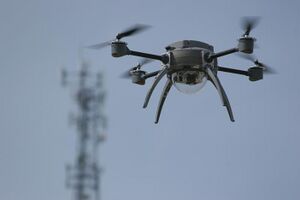Engineering:Aeryon Scout
| Scout | |
|---|---|

| |
| Aeryon Scout in flight | |
| Role | Miniature UAV |
| Manufacturer | Aeryon Labs |
| Designer | Aeryon Labs |
| First flight | August 2007 |
| Introduction | November 2009 |
| Status | Production completed |
| Produced | 2009–2015 |
Aeryon Scout is a small reconnaissance unmanned aerial vehicle (UAV) that was designed and built by Aeryon Labs of Waterloo, Ontario, Canada. The vehicle was developed between 2007 and 2009 and produced from 2009-2015. Production has been completed and it is no longer advertised for sale on the company website.[1]
The Scout is a vertical take-off and landing VTOL quadcopter requiring no launch equipment. It can hover in a fixed position and weighs 3.0 lb (1.4 kg) without payload.[2]
Design and development
The Scout is a quadcopter in layout, with four rotors mounted on booms and four landing gear legs. Payloads are mounted underneath the fuselage on a gimbal mount.[3]
The Scout can be operated beyond the line of sight up to 3 kilometres (1.9 miles) from the user, with a designed operational altitude above ground level of 300 to 500 feet at flying speeds of up to 50 kilometres per hour (31 miles per hour) and an endurance of 25 minutes.[2][4] The Scout's design allows flight in adverse weather conditions and it has been flown in wind speeds of 80 kilometres per hour (50 mph) and temperatures ranging from −30 °C to +50 °C. All communications are digital and encrypted, which reduces the risk of hijacking and video interception.[3]
The Scout is controlled with a Tablet PC-based interface.[5] This system differs from the customary method of joystick control in allowing users to operate the vehicle with minimal training. The Scout is piloted by pointing to an area on the map.[2] Height is controlled using a scroll on the touch screen interface. The system operates using custom or commercially available map data in several formats including MrSID. Real-time maps can also be used during flight and the Scout can be flown real-time by the operator or pre-programmed to fly a series of GPS waypoints. The Scout constantly monitors external conditions such as wind speed, as well as internal functions, such as battery level, allowing it to make an automated decisions en route to return home, land immediately or hover and wait.[2]
The Scout has a quick-change payload interface with common interfaces including USB and Ethernet, which allows custom payloads to be developed. The system is able to detect the type of payload connected, and configure it and operate it appropriately. The payload capacity of the system is 250 g (0.55 lb). Offered payloads include gimbal-mounted digital still and video cameras, a near-IR camera for remote sensing, a FLIR night-vision camera and a stabilized 10x Optical Zoom camera.[3]
Operators
- BP[6]
- Halton Regional Police Service[7]
- Libyan National Liberation Army (National Transitional Council)[8]
- Ontario Provincial Police[9]
- Saudi Arabian Army[10]
Specifications
General characteristics
- Crew: none
- Length: 0.8 m (2 ft 7 in)
- Height: 0.30 m (1 ft 0 in)
- Gross weight: 1.4 kg (3.1 lb)
- Max takeoff weight: 1.7 kg (3.74 lb)
- Powerplant: 4 × Intelligent LiPo battery Electric motor
- Main rotor diameter: 4× 0.8 m (2 ft 7 in)
- Propellers: 0.3 m (1 ft 0 in) diameter
Performance
- Maximum speed: 50 km/h (31 mph, 27 kn)
- Cruise speed: 40 km/h (25 mph, 22 kn)
- Range: 3.0 km (2.0 mi, 1.7 nmi)
- Endurance: 24 minutes
- Service ceiling: 333 m (1,000 ft) AGL 5,000 m (15,000 ft) ASL
- Rate of climb: 2 m/s (390 ft/min)
Avionics
- High resolution, day/night cameras with optical and digital image stabilization and mechanical pan/tilt/zoom
See also
Related lists
References
- ↑ Aeryon Labs (2018). "Products". /www.aeryon.com. https://www.aeryon.com/.
- ↑ 2.0 2.1 2.2 2.3 "Aeryon Scout". Aeryon.com. http://www.aeryon.com/products/avs/aeryon-scout.html. Retrieved 2013-12-10.
- ↑ 3.0 3.1 3.2 Aeryon Labs, Aerial Intelligence in the Palm of Your Hand , dated 2013, retrieved 10 December 2013
- ↑ "Scout Technical Specifications". Aeryon Labs
- ↑ "Flying Surveillance Robots Coming Soon from Aeryon – Rafe's Radar". CNET News.
- ↑ Unmanned aircraft to assist oil spill response. Aeryon Labs, dated 26 July 2011, retrieved 10 December 2013.
- ↑ Aeryon Awarded Contract to Supply Scout UAV to Halton Regional Police. Aeryon Labs, dated 2 March 2011, retrieved 10 December 2013.
- ↑ Ha, Tu Thanh (August 23, 2011). "How High-Tech Canadian Drones Gave Libyan Rebels a Boost". The Globe and Mail (Toronto). https://www.theglobeandmail.com/news/world/africa-mideast/libyan-rebels-assisted-by-canadian-made-drones/article2139481/. Retrieved August 25, 2011.
- ↑ "OPP testing unmanned flying drone". CBC News. May 9, 2013. http://www.cbc.ca/news/canada/toronto/story/2013/05/09/toronto-opp-drones.html.
- ↑ "Photo of Saudi Army with Aeryon Scout UAV". https://twitter.com/SaudiArmyNews/status/335404356637716480.
External links
